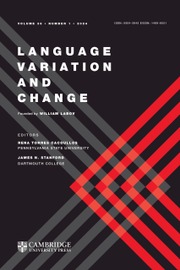Crossref Citations
This article has been cited by the following publications. This list is generated based on data provided by
Crossref.
Fromont, Robert
and
Watson, Kevin
2016.
Factors influencing automatic segmental alignment of sociophonetic corpora.
Corpora,
Vol. 11,
Issue. 3,
p.
401.
Leach, Hannah
Watson, Kevin
and
Gnevsheva, Ksenia
2016.
Perceptual dialectology in northern England: Accent recognition, geographical proximity and cultural prominence.
Journal of Sociolinguistics,
Vol. 20,
Issue. 2,
p.
192.
Watson, Kevin
2017.
The Handbook of Dialectology.
p.
439.
Watson, Kevin
and
Clark, Lynn
2017.
Listening to the Past.
p.
114.
Wang, Xuan
2017.
Investigating the role of speaker attitudes in koinéisation in Hohhot, China.
Asia-Pacific Language Variation,
Vol. 3,
Issue. 2,
p.
232.
Nance, Claire
Kirkham, Sam
and
Groarke, Eve
2018.
Sociolinguistics in England.
p.
275.
VAN EYNDHOVEN, SARAH
and
CLARK, LYNN
2020.
The <quh->–<wh-> switch: an empirical account of the anglicisation of a Scots variant in Scotland during the sixteenth and seventeenth centuries.
English Language and Linguistics,
Vol. 24,
Issue. 1,
p.
211.
Gnevsheva, Ksenia
Gonzalez, Simon
and
Fromont, Robert
2020.
Australian English Bilingual Corpus: Automatic forced-alignment accuracy in Russian and English.
Australian Journal of Linguistics,
Vol. 40,
Issue. 2,
p.
182.
Seyfarth, Scott
and
Garellek, Marc
2020.
Physical and phonological causes of coda /t/ glottalization in the mainstream American English of central Ohio.
Laboratory Phonology: Journal of the Association for Laboratory Phonology,
Vol. 11,
Issue. 1,
p.
24.
Villarreal, Dan
Clark, Lynn
Hay, Jennifer
and
Watson, Kevin
2021.
Gender separation and the speech community: Rhoticity in early 20th century Southland New Zealand English.
Language Variation and Change,
Vol. 33,
Issue. 2,
p.
245.
Cooper, Paul
and
Lampropoulou, Sofia
2021.
“Scouse” but not “Scouser”? Embedded enregistered repertoires for adolescent girls on The Wirral.
Language & Communication,
Vol. 78,
Issue. ,
p.
109.
Lampropoulou, Dr Sofia
and
Cooper, Dr Paul
2021.
The “grammar school pressure”: From tolerance to distance, to rejection of ‘Scouse’ in middle-class Merseyside schools.
Linguistics and Education,
Vol. 66,
Issue. ,
p.
100996.
Garellek, Marc
2022.
Theoretical achievements of phonetics in the 21st century: Phonetics of voice quality.
Journal of Phonetics,
Vol. 94,
Issue. ,
p.
101155.
Riverin-Coutlée, Josiane
Roy, Johanna-Pascale
and
Gubian, Michele
2023.
Using Mahalanobis Distances to Investigate Second Dialect Acquisition: A Study on Quebec French.
Language and Speech,
Vol. 66,
Issue. 2,
p.
291.
2023.
Sounds of English Worldwide.
p.
354.
Docherty, Gerard
Foulkes, Paul
and
Kerswill, Paul
2024.
Language in Britain and Ireland.
p.
70.
2024.
Language in Britain and Ireland.
p.
9.
Montiel-McCann, Camila
Lampropoulou, Sofia
Cooper, Paul
and
Byrne, Rachel
2025.
Pink rollers and fake tan.
Journal of Language and Pop Culture,
Vol. 1,
Issue. 1,
p.
50.


